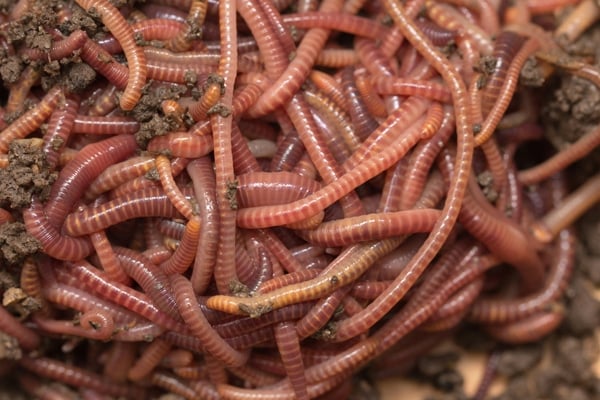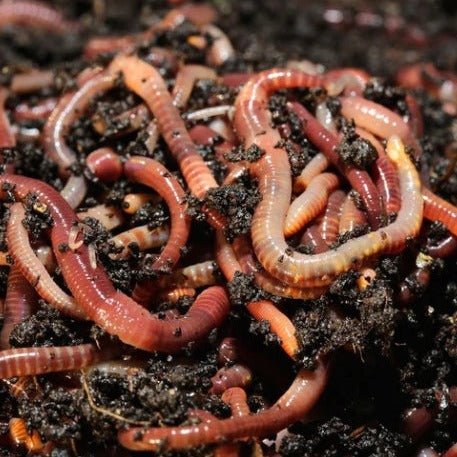Choose Lake Hickory Bait for High-Quality Worms, Tackle, and More
Choose Lake Hickory Bait for High-Quality Worms, Tackle, and More
Blog Article
Unlock the Tricks of Red Wigglers: Your Guide to Composting Success
The integration of red wigglers right into composting methods presents a substantial chance for improving soil health and advertising sustainability. Comprehending their needs and actions is vital for enhancing their potential, from establishing up a suitable worm bin to feeding them the appropriate materials.

What Are Red Wigglers?
(Lake Hickory Bait)Red wigglers, scientifically referred to as Eisenia fetida, are a types of earthworm primarily made use of in composting because of their remarkable capacity to break down natural matter successfully. These worms are defined by their reddish-brown pigmentation and a segmented body, typically determining between 3 to 4 inches in size. Unlike other earthworm types, red wigglers thrive in rich, natural atmospheres, making them ideal for vermicomposting systems.
Belonging To The United States And copyright, they are typically located in rotting fallen leaves and compost stacks, where they play a crucial function in nutrient recycling. Their adjustment to living in a damp, cardio atmosphere allows them to consume big quantities of organic waste, damaging it down into nutrient-rich castings that improve dirt health.
Red wigglers replicate swiftly, with a solitary worm qualified of generating numerous cocoons each week, each consisting of numerous hatchlings. Recognizing the biology and behavior of red wigglers is essential for maximizing their potential in composting applications.
Benefits of Utilizing Red Wigglers
Harnessing the power of red wigglers in composting provides various benefits that enhance soil health and promote sustainable waste monitoring. These remarkable microorganisms successfully damage down natural matter, transforming kitchen scraps and yard waste right into nutrient-rich vermicompost. This ended up item is remarkably helpful for plant growth, as it improves soil framework, raises dampness retention, and improves nutrient availability.

(Red Wiggler Express)Furthermore, the presence of red wigglers in your composting system can increase the composting process, generating top notch compost in a portion of the time contrasted to standard methods. The spreadings produced by these worms are additionally bursting with advantageous microbes that additionally enrich the dirt community.
Establishing Your Worm Bin
Developing an efficient worm container is a straightforward procedure that can considerably boost your composting efforts. The very first step is choosing a suitable container. Worm bins can be made from plastic storage space bins, wooden boxes, or readily available worm containers. Ensure the bin has ample drainage and ventilation openings to maintain ideal dampness degrees and airflow.
Next, prepare the bed linen product, which works as the worms' habitat. A mix of shredded newspaper, cardboard, and coconut coir works well, supplying a comfy setting for the worms. Aim for a bed linen depth of regarding 4-6 inches. Dampen the bed linens gently, ensuring it resembles a damp sponge without excess water pooling at the bottom.

Feeding Your Red Wigglers
To make certain the health and efficiency of your red wigglers, it is necessary to give them with a well balanced diet that fulfills their dietary demands. Red wigglers prosper on a diverse array of natural materials, which not just supply essential nutrients however also advertise efficient composting.
Beginning by integrating cooking area scraps such as vegetable peels, fruit cores, and coffee premises. Prevent citrus fruits, onions, and garlic, as these can be detrimental to worm health and wellness. Additionally, present shredded paper, cardboard, and completely dry leaves to develop a well-aerated atmosphere.
Feeding regularity ought to be checked; typically, worms can eat half their body weight in food weekly. It is essential to stay clear of overfeeding, as excess food can result in undesirable odors and draw in parasites. A good method is to include food in little quantities, permitting worms to process it prior to presenting more.
Preserving dampness levels is likewise crucial; the bedding ought to perspire yet not soggy. Finally, make certain to routinely inspect the temperature level and pH degrees of the bin to guarantee an optimum environment for your red wigglers, eventually improving their composting performance.
Harvesting and Making Use Of Garden Compost
An effective composting process with red wigglers culminates in the abundant, dark garden compost understood as vermicompost, which can substantially boost soil wellness and plant development. Gathering this nutrient-dense material generally occurs every 3 to 6 months, depending upon the size of your system and the quantity of natural matter being refined.
To gather, gently different the use this link garden compost from the worms and any type of undecomposed products. One reliable technique involves relocating the components of the bin away and adding fresh bed linens and food to the vacant space, urging the worms to migrate. After a few days, the garden compost can be collected from the contrary side.
It is essential to use vermicompost appropriately to maximize its advantages. By including vermicompost into your horticulture routine, you not only recycle natural waste but likewise develop a thriving environment that sustains sustainable gardening methods.
Verdict
In summary, red wigglers serve as remarkable allies in composting efforts, transforming organic waste into nutrient-rich vermicompost. By understanding the optimal problems for their environment, feeding needs, and garden compost harvesting strategies, garden enthusiasts can boost dirt health and wellness and promote plant vitality.
Report this page